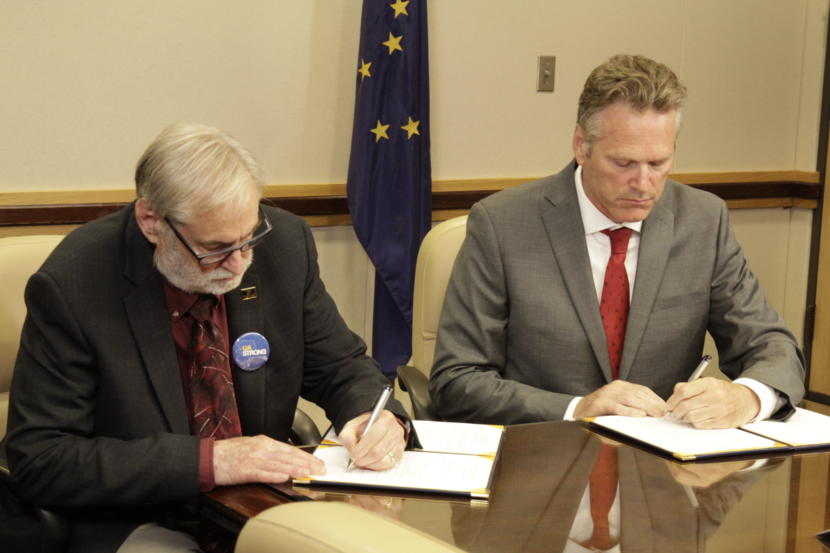
In a major reversal, Gov. Mike Dunleavy announced Tuesday he’s agreed to restore roughly half of the funding he vetoed from the University of Alaska budget earlier this summer. And the cut would happen over three years instead of one. The move is one of several reversals Dunleavy has made after hearing from the public about his vetoes.
At a press conference, Dunleavy acknowledged that his initial cut was steep. He said he and university leaders have met in the middle on this new agreement.
“The three-year approach also includes understandings that the university will do certain things and my office will do certain things in support of the university’s efforts to make it a better university,” Dunleavy said.
Under the agreement signed by the governor, UA President Jim Johnsen and UA Board of Regents Chair John Davies, the University of Alaska will see a $25 million cut in funding for this budget year, which began on July 1. The next two years would see cuts of $25 million and $20 million, for a total of $70 million.
When Dunleavy vetoed University of Alaska funding from the operating budget in June, it left the university with a $135-million-sized hole in funding, representing about 40% of state support.
Davies said that the agreement should make the UA community less anxious about the university’s fiscal future.
“Most importantly, the governor’s supplemental operating budget provides much more certainty for our students, staff, faculty and the communities we serve,” Davies said. “One of the biggest problems has been the uncertainty. I think that this agreement will provide a great deal of certainty so we can begin the process of moving forward together.”
The governor’s vetoes also led the board of regents to make two major financial decisions. The first was to declare financial exigency, which makes it easier to fire faculty, including those with tenure. The second was the recommendation that the university be consolidated from three accredited universities to one.
Johnsen said that the decision to reverse the declaration of exigency is up to the regents, but he anticipates a smaller number of layoffs than previously announced. Johnsen also said that even with the reduced cuts in the compact, he still supports moving the university system to a single-university model.
“I think the university is spending too much of its share of resources, whether its — whatever the number is — on administration and administrative overhead,” Johnsen said. “I want to put a larger share of whatever money we’re allocated from the state and from our students’ tuition, from research grants and contracts, I want that money going to academics and student services and less of it going to administrative structure.”
Classes at the University of Alaska begin in two weeks on Aug. 26. The uncertainty budget cuts created for students, staff and faculty left many people unsure about whether or not they’d stay with the university.
Johnsen said while the agreement comes only days before the school year starts, the entire UA community should be optimistic.
“We’re open for business. As Regent (Mary) Hughes said in our recent meeting, ‘We’ve been here 100 years. We’re going to be here in 100 years.’ We’ve been very strong in putting as our top priority our students and the academic programs they’re in,” Johnsen said. “So I think with this three-year agreement, we’ll be able to ensure that our students all across the state have access to the programs they need.”
The next step for the University of Alaska system will be to review options for consolidating from three separate accredited universities to one. That’s set to occur at their next board of regents meeting on Sept. 12 and 13.
